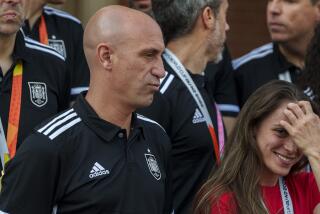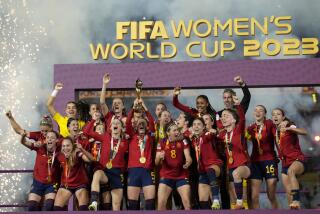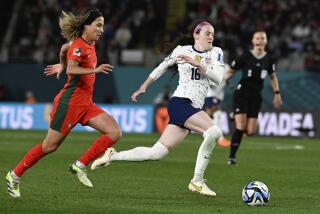WORLD CUP USA ’94 / THE FIRST ROUND : Spain Isn’t Half-Bad to Tie Germany : Group C: Spaniards come out aggressively, but both teams slow down after Klinsmann ties it.
CHICAGO — Well, so much for Berti Vogts’ theories.
Before his German team played Spain at Soldier Field on Tuesday afternoon, Vogts had predicted the Spaniards would take a less-than-adventurous approach to the game.
“Spain has more at stake and I expect them to be cautious, to play defensively, to wait for our mistakes, and then hope to get three points (by defeating) Bolivia,” Vogts said.
Spanish Coach Javier Clemente must have heard about the remark because the Spaniards came out playing anything but cautiously. Had they had the courage to continue in that fashion, they might even have beaten the defending world champion.
But in the end, Germany and Spain settled for a 1-1 tie in a game that started out well but fizzled in the second half. By the time the final whistle sounded, many in the crowd of 63,113 were whistling and booing both teams.
Of all the World Cup games in this tournament, the second 45 minutes of this one was the most negative and unattractive.
It need not have been that way.
Spain came in having been tied, 2-2, by South Korea in its first Group C opener, while the Germans were coming off a 1-0 victory over Bolivia. The teams’ World Cup history pointed to a German victory.
The countries had met twice before in the competition, with the Germans emerging victorious on each occasion: 2-1 in England in 1966 and 2-1 in the quarterfinals of the 1982 tournament in Spain.
But this time Spain had a chance, especially after an extraordinary goal by Juan Antonio Goikoetxea in the 14th minute.
Taking the ball down into the right corner, Goikoetxea crossed it into the center from an acute angle. The ball curved over the outstretched fingertips of German goalkeeper Bodo Illgner, struck the inside of the far post and rebounded into the net.
Even Goikoetxea could not believe his luck.
“My intention was to center the ball, not to score,” he said, “but the ball entered the goal. It was definitely a big day for me. It will be a great memory.”
The 1-0 score held up for the rest of the half as Spain continued to attack with rare zeal and the Germans found themselves having to pay more attention to their defense than their offense.
That changed three minutes into the second half when Juergen Klinsmann scored a somewhat strange goal of his own.
A free kick by Thomas Haessler on the right curled into the goal area and Klinsmann leaped above a crowd of players to send a sharp, downward header toward the net in front of goalkeeper Andoni Zubizarreta.
The ball took a high bounce over the keeper’s head and wound up in the back of the net to the astonishment of many, not the least of whom was Zubizarreta.
“If I could, I would have stopped it,” he said. “It was a lucky goal in some ways. I’d like to see it on television. I felt a player was offside. The surface was so hard, it took a high bounce and, surprisingly, went in at the other post.”
Whatever the reason for the goal, it was enough to get Germany even and from then on it soon became obvious that both teams were settling for a tie.
Clemente denied it.
“I think we played a strong game,” he said. “We tried our best against Germany, the world champion. We should be satisfied. It was a balanced game. We wanted to win. Unfortunately, Germany tied the game. We did not take advantage of the first goal.”
Spain was without its team captain and key defensive player, Miguel Angel Nadal, who was banned for two games by FIFA for committing what is called a “professional foul”--that is, an intentional foul to prevent an opposing player from scoring--in the first half of Spain’s game against South Korea in Dallas.
The severity of the penalty had Clemente fuming.
“When referees become the principal argument in the game, then it’s goodby to soccer,” he said. “A lot of the referees don’t have enough knowledge about the new regulations (banning tackling from behind, for example). Not all the referees apply the rules the same way.”
Nadal has to depend on Spain getting through to the next round if he hopes to play another World Cup game this summer.
Before Tuesday’s game, Clemente had sounded optimistic.
“One win from two games, that’s all we need,” he said. “Our luck will have to change, but we have no worries at all about the future.”
That win will now have to come against Bolivia on Monday if Spain hopes to advance. Clemente has an odd way of looking at results.
“The Korean tie could be regarded as a loss,” he said. “We did not play as well (as on Tuesday). We did not feel very confident. A tie against the Germans could be regarded as a victory since they are very strong.
“We have to win against Bolivia now.”






